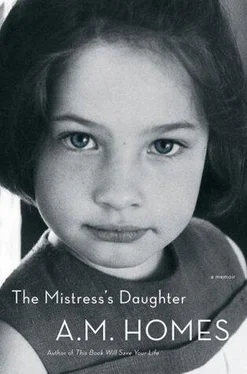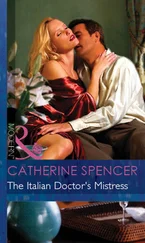“Thanks,” I say, hanging up. I try another lab.
According to Pat at LabCorp of America they too don’t have the results. “We keep our records for seven years.”
“When did you start doing DNA testing?”
“Hold on.”
I’m on hold with tin can music in my ear. I’m on hold for a long time and it occurs to me that she just put me on hold to make me wait and is sitting there on the other end, picking her nose. It occurs to me that she might not come back. “First in its industry to embrace genomic testing,” says the background tape.
“Nineteen eighty-one,” she says, coming back on the line. There is a peculiar coldness, a kind of self-satisfaction to the way these people say, We don’t have that, as though they have no idea what that might mean, they really don’t care, as though they get enormous and perverse pleasure from emptying the electronic trash can on their computer screen. Gone, gone, and gone.
One of the lawyers asks if I have any letters from him. I think somewhere I might have a birthday card. Would there be enough DNA on the envelope to get a result? And anyway, without him already in a database, how would we deny or confirm?
Again the lawyers debate. We talk about the fact that I have not said his name in public, have never printed the information. I am wondering if my father realizes that until now I’ve never told anyone who he is. In fact, the origin of this book, a long piece I wrote for the New Yorker in 2004, reflected my desire to continue to protect him. In that article, I called Norman “Stan” and Ellen “Helene.” I’m wondering if Norman knows that what I wrote for the New Yorker was so convincing that when it was time for the magazine to fact-check the article, they e-mailed me and asked for “Stan’s” phone number. “My father’s name is not really Stan,” I explained. And again they asked for his name and number. I told them that I had never given anyone that information and I would not be able to provide it to them.
Only after the magazine first threatened and then did briefly kill the piece did I question why I was ruining my professional reputation protecting the identity of someone who had never shown any particular concern for me. Still, I didn’t think they needed to bother the man. They insisted. The New Yorker has what they call a double standard for fact checking — if the subject is to be unidentified or masked, not only does the subject have to be rendered unrecognizable to others, but also unrecognizable to himself. My father, simply by knowing that he is my father, had his cover blown.
The way the magazine killed the piece — as if doubting me — practically killed me. For the first time in years, I felt that my right to exist was in question. That there was any doubt to the truth of my story sent me into a spin. It had never been my desire to expose my father — and at the same time I couldn’t help but wonder, why was I being so protective? Finally I gave the New Yorker his phone number. I have no idea what was said between the magazine and my father and his lawyer. I asked to be there, a witness to the conversation, but the fact-checker refused. From what the fact-checker told me, I understood there were thirty-five questions the magazine wanted to ask; they detailed them for my father and his lawyer — and my father and his lawyer declined to answer any of them. The piece was published by the New Yorker in December of 2004.
I confer with my lawyers about the DAR application — it occurs to more than one of them that the lawyer for my adoptive parents might actually have a copy of my original birth certificate, because it was a private adoption and because my mother never signed the papers, and someone had to provide the court with a copy of the original birth certificate.
The lawyer I have to call is the man who called my parents in 1992 to tell them that Ellen had contacted him, the same lawyer who opened the letters from Ellen, who recognized my father’s name and called Ellen to say, if you’re going to give her (me) that information, you’d better tell him.
Dialing the lawyer’s house, I have chest pains. His wife answers — she is tentative when I ask for him. “May I ask who’s calling?”
“A.M. Homes.”
“May I ask, what is it about?”
And I explain, “Mr. Frosh helped my parents finalize my adoption back in 1961. It was a private adoption and I spoke with him several years ago when my birth mother contacted him trying to reach me — and now I have some questions.”
There is a pause. “He’s not entirely well.”
“I’m so sorry,” I say, wondering what that means — again, always the fear that I’ve called too late.
“He’s eighty-seven and some days he knows everything and the next remembers nothing. But I will ask him when it seems like a good moment.”
“Thank you,” I say. “What I’m looking for is the file, a copy of the file.”
“Maybe my son Brian,” she says.
“Yes,” I say, “if he could find it, that would be great. I think he knows about it. When my birth mother called, she actually first called Brian.” (Brian is also a lawyer).
And then she tells me a story of someone, maybe her daughter, maybe a neighbor, having adopted two Romanian children. At this point I’m having what I call situational deafness. I am worrying about the fact that I may not be able to get this information. I’ve half of a mind to say: Do you know where he kept his files? Are they stored somewhere? But instead I say, “Did it work out?” And I think she says yes, and I say something like, “That’s good. Good or bad, up or down, it’s all interesting, isn’t it?”
“Are you having a good life?” she asks, like she wants to know, did it all work out?
“A good life? Yes,” I say, both lying and not. I’m having a great life. “I’m really lucky. I have a great life.” And it is equally true that I am suffering, otherwise I wouldn’t be calling her. “Everything is good,” I tell her.
“That’s good,” she says. “Have a good life.”
I contact the lawyer’s son Brian Frosh, now a Maryland state senator. We exchange e-mails; I tell him about my conversation with his mother and remind him of the call he intercepted from Ellen years ago. I ask Brian if, when he visits his parents’ house, he might check for the file. He is incredibly gracious and understanding. We trade stories of what it is like to have an aging parent, our concerns for our families, for the history that is lost. Brian Frosh makes a special trip to his parents’ house to look for the file — he looks everywhere, but finds nothing.
I am running out of options.
The question of whether or not to sue, to attempt to legally compel my father to produce the DNA document or an affidavit, remains open. Joining the DAR is not essential to my health and well-being, but the idea that my father — or any one person — can decide to exclude someone from her lineage profoundly bothers me. The real question is not about the DAR but about adoptees’ rights to access and join their own heritage — and for that reason I am not entirely willing to drop the subject.
I think of my father asking me to have the DNA test and then later refusing my request for the DNA document, refusing to sign an affidavit, and refusing to acknowledge me. I think of my father and can’t help but think of Ellen — falling for him when she was just a teenager, being his mistress for seven years, and then pregnant with his child. I think of Ellen and I think of how my father behaved — making her promises, stringing her along, and ultimately abandoning her.
Nothing has changed. More than forty years later he is still behaving exactly as he always behaved. He is doing what is good for him, what suits his needs and desires. I see my mother as a teenager in love with an older man, a young woman who had to give up her child, who lived the rest of her life in the shadow of that loss, a woman who never married, who never really recovered — and for her I am angry with him.
Читать дальше












